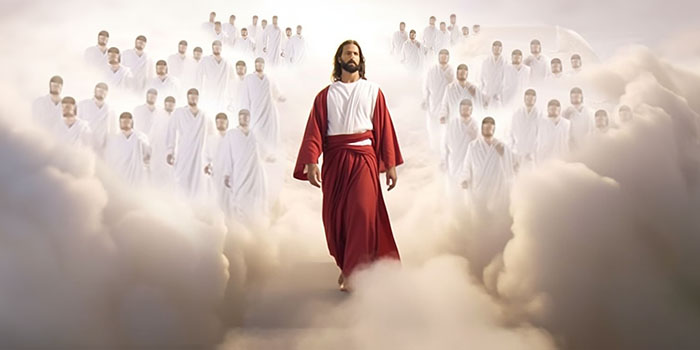
1. The Declaration
We believe that 'confessedly great is the mystery of godliness.' While God absolutely is Spirit and invisible, Whom no man has seen or can see, yet for the purpose of creation, He assumed the limitations suggested by the titles, 'The Image of the invisible God,' 'The Form of God,' and 'The Word,' and for the purpose of redemption He yet further limited Himself by being made flesh and tabernacled among us as The Only Begotten of The Father. In spite of all such limitations, and in spite of the problems arising out of His incarnation, we believe we may, with Thomas, fully and unreservedly bow at the feet of Christ and say: 'My Lord and my God'.
2. Scriptural Grounds
'In the beginning was the Word, and the Word was with God, and the Word was God ... All things were made by Him ... the world was made by Him' (John 1:1, John 1:3, John 1:10).
'Before Abraham was, I Am' (John 8:58).
'Who being the brightness of His glory, and the express image of His person, and upholding all things by the word of His power ... Unto the Son He saith, Thy throne, O God, is for ever and ever ... Thou, Lord, in the beginning hast laid the foundation of the earth; and the heavens are the works of thine hands: they shall perish; but Thou remainest' (Heb. 1:3, Heb. 1:8, Heb. 1:10-11).
'Who is the image of the invisible God, the firstborn of every creature: for by Him were all things created, that are in heaven, and that are in earth, visible and invisible, whether they be thrones, or dominions, or principalities, or powers: all things were created BY Him, and FOR Him: and He is before all things, and by Him all things consist' (Col. 1:15-17).
'Who, being in the form of God, thought it not robbery to be equal with God: but made Himself of no reputation' (Phil. 2:6-7).
' ... The church of God, which He hath purchased with His own blood' (Acts 20:28).
' ... shall call His Name Immanuel - God with us' (Isa. 7:14; cf. Matt. 1:23).
'Unto us a child is born, unto us a Son is given ... and His Name shall be called ... The mighty God' (Isa. 9:6).
'These things said Esaias (Isaiah), when he saw His (Christ's) glory, and spake of Him' (John 12:41).
' ... Mine eyes have seen the King, the LORD of Hosts' (Isa. 6:5).
'1 am the LORD: that is My Name: and My glory will I not give to another' (Isa. 42:8).
3. An Expansion And Exposition Of Some Aspects Of This Mighty Theme.
It has been pointed out that in the frescoes painted by Fra Angelico, the figure of the Saviour is much below the average, the reason being that when this artist attempted to portray his Lord, the solemnity and majesty of his subject overwhelmed him.
We have no ability to select a pictorial representation of the Lord at all, but today, people demand graphics, so we make a feeble attempt to display something. Even when we try to relate in words, Fra Angelico's difficulty expresses something of our own. How can we adequately express what the Lord Jesus is to us? If we are brief, it may seem that we have no reverence for our theme. If we are lengthy, all the pages at our disposal cannot touch the fringe of the subject. If we make no reference to false translations such as that of John 1:1, where some render the passage, 'The Word was a God,' the omission may be misconstrued. If we load our pages with refutations and arguments, we may put out our hands to stay the ark of God. Reasoning and logic are true only when employed within the sphere of our experience. It is true for us to say that nothing can be in two places at one and the same time, but such logic becomes untrue when taken into God's Sphere. We, therefore, content ourselves with the following brief exhibition of the Scriptural grounds for our faith concerning the Person of the Lord Jesus Christ.
We most surely believe that the Lord Jesus Christ is both God and man - 'God manifest in the flesh.' We adhere to the AV. of 1 Timothy 3:16.
We believe that Christ, as a perfect sinless man, was miraculously born of a virgin. Himself untainted by the fall of Adam.
According to Scripture, there are three outstanding attributes of God which He declares belong to no one else. These three attributes are unreservedly given by Scripture to the Lord Jesus Christ.
1. Creator
'In the beginning God created the heaven and the earth' (Gen. 1:1).
' . . . in six days the LORD made heaven and earth' (Exod. 20:11).
'For thus saith the LORD that created the heavens; God Himself that formed the earth and made it ... I am the LORD; and there is none else' (Isa. 45:18).
2. Redeemer
'Thus saith the LORD the King of Israel, and His Redeemer the LORD of hosts; I am the first, and I am the last; and beside Me there is no God' (Isa. 44:6).
3. Jehovah - Lord
'I am the LORD: that is My name: and My glory will I not give to another' (Isa. 42:8).
In each of these statements, the claim is exclusive. And we may now seek to shew that these exclusively divine attributes belong to Christ.
1. Jesus Christ is the Creator
'All things were made by Him ... He was in the world, and the world was made by Him, and the world knew Him not' (John 1:3, John 1:10).
He made the world. Yet He was in the world. This chapter recognizes the problem and solves it.
' ... The Word was God' (John 1:1).
' ... the Word was made (became) flesh' (John 1:14).
' ... by Him were all things created, that are in heaven, and that are in earth, visible and invisible, whether they be thrones, or dominions, or principalities, or powers: all things were created by Him, and for Him: and He is before all things, and by Him all things consist' (Col. 1:16-17).
The range here is tremendous. Not only is creation attributed to Christ, but it is for Him and held together by Him. Here, instead of the title 'The Word,' we have 'The Image of the Invisible God' and 'The Firstborn of every creature'. If the title 'Firstborn' be construed as meaning that the Lord had no existence before, how shall we explain its recurrence in Col. 1:18, 'The Firstborn from the dead'? If we accept the inspired explanation which is given in the passage considered - 'The Beginning' - we shall understand its bearing upon creation itself. Christ is called 'The beginning of the creation of God' (Rev. 3:14), not because He was the first One created, but because He created all things.
The first verse of Hebrews states that in times past, God spoke by the prophets, but the second verse reveals a deeper truth - He has since spoken Himself, for the words are, 'Hath in these last days spoken unto us by His Son (in Son).' The Son is addressed as 'God' and 'Lord' (Heb. 1:8, Heb. 1:10), and the creation, including heaven and earth, is attributed to Him. As we read Isaiah 45:18 and the passages from John, Colossians, and Hebrews already quoted, we have no alternative but to bow in the presence of the Saviour and say, 'My Lord and my God.'
2. Jesus Christ is the Redeemer
There is no need to quote chapter and verse. All we need do is to remind the reader of Isaiah 44:6 and to affirm that Whoever is, in a Scriptural sense, The Redeemer is God.
3. Jesus Christ is the Lord
' ... Every tongue should (shall) confess that Jesus Christ is Lord, to the glory of God the Father' (Phil. 2:11).
This is a quotation from Isaiah 45:23, and by reading the four previous verses in this Chapter, we learn that the One referred to as 'Lord' is God:
'There is no God else beside Me ... I am God, and there is none else. I have sworn by Myself, the word is gone out of My mouth in righteousness, and shall not return, That unto Me every knee shall bow, every tongue shall swear'.
Isaiah 42:8 declares that the Lord will not give His glory to another. When we read that Jesus Christ is Lord, it means that He is the Jehovah of the Old Testament, the 'I AM' who was before Abraham.
John 12:41 declares that when Isaiah saw the Lord high and lifted up in the temple, he saw the glory of the Lord Jesus Christ, while Hezekiah most emphatically affirms that the Lord of Hosts seen by Isaiah was 'God ... alone' (Isa. 37:16).
We can understand that the Creator is God, but that this is true of The Redeemer, Who is necessarily man (for He must die), is at first sight a difficulty to many. Yet the question of the deity of Christ could be decided by this matter alone, for He Who is a Redeemer in the Scriptural sense must be God and must also be man. No one else can fill the position, for the Hebrew word for The Redeemer is Goel, meaning a kinsman (as in the story of Ruth). If Jesus Christ is not God, and if He is not truly man, we have no Redeemer.
Now the Redeemer has the following titles in Isaiah:- 'Lord,' 'The Lord of Hosts,' 'The mighty One of Jacob,' 'The Holy One of Israel,' 'The Creator of Israel,' 'Beside Me there is no God' (Isa. 41:14; Isa. 47:4; Isa. 49:26; Isa. 54:5; Isa. 43:15; and Isa. 44:6). Here, then, is the problem. How can God, the Creator, the Lord of Hosts, be 'next of kin' to man? Isaiah, whose emphasis upon the Godhead of the Redeemer creates the problem, supplies the solution:
' ... Behold, a virgin shall conceive, and bear a son, and shall call his name Immanuel' (Isa. 7:14).
'Unto us a child is born, unto us a son is given: and the government shall be upon His shoulder: and His name shall be called Wonderful, Counsellor, The mighty God, The everlasting Father, The Prince of Peace' (Isa. 9:6).
' ... Fear not to take unto thee Mary thy wife: for that which is conceived in her is of the Holy Ghost. And she shall bring forth a Son, and thou shalt call His name JESUS: for He shall save His people from their sins. Now all this was done, that it might be fulfilled which was spoken of the Lord by the prophet, saying, Behold, a virgin shall be with child, and shall bring forth a son, and they shall call His name Emmanuel, which being interpreted is, God with us' (Matt. 1:20-23).
' ... Feed the church of God, which He hath purchased with His own blood' (Acts 20:28).
Next




























